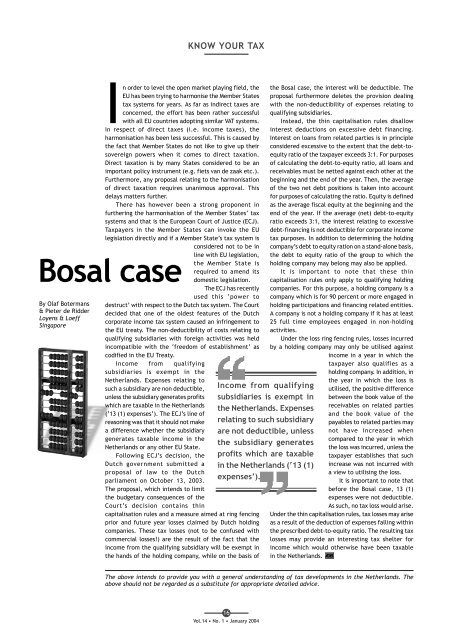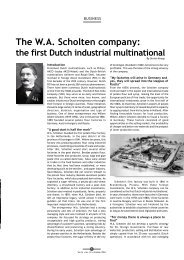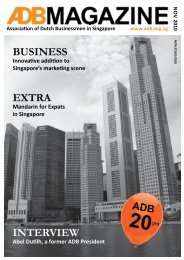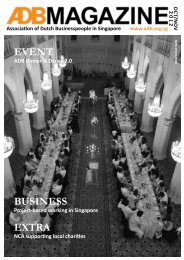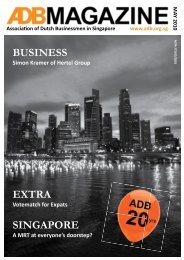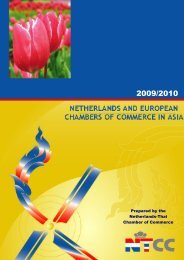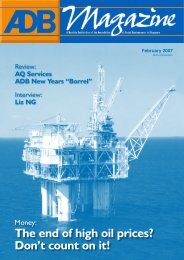January 2004 - Association of Dutch Businessmen
January 2004 - Association of Dutch Businessmen
January 2004 - Association of Dutch Businessmen
You also want an ePaper? Increase the reach of your titles
YUMPU automatically turns print PDFs into web optimized ePapers that Google loves.
KNOW YOUR TAX<br />
In order to level the open market playing field, the<br />
EU has been trying to harmonise the Member States<br />
tax systems for years. As far as indirect taxes are<br />
concerned, the effort has been rather successful<br />
with all EU countries adopting similar VAT systems.<br />
In respect <strong>of</strong> direct taxes (i.e. income taxes), the<br />
harmonisation has been less successful. This is caused by<br />
the fact that Member States do not like to give up their<br />
sovereign powers when it comes to direct taxation.<br />
Direct taxation is by many States considered to be an<br />
important policy instrument (e.g. fiets van de zaak etc.).<br />
Furthermore, any proposal relating to the harmonisation<br />
<strong>of</strong> direct taxation requires unanimous approval. This<br />
delays matters further.<br />
There has however been a strong proponent in<br />
furthering the harmonisation <strong>of</strong> the Member States’ tax<br />
systems and that is the European Court <strong>of</strong> Justice (ECJ).<br />
Taxpayers in the Member States can invoke the EU<br />
legislation directly and if a Member State’s tax system is<br />
considered not to be in<br />
line with EU legislation,<br />
Bosal case<br />
the Member State is<br />
required to amend its<br />
domestic legislation.<br />
The ECJ has recently<br />
used this ‘power to<br />
By Olaf Botermans destruct’ with respect to the <strong>Dutch</strong> tax system. The Court<br />
& Pieter de Ridder<br />
decided that one <strong>of</strong> the oldest features <strong>of</strong> the <strong>Dutch</strong><br />
Loyens & Loeff<br />
corporate income tax system caused an infringement to<br />
Singapore<br />
the EU treaty. The non-deductibility <strong>of</strong> costs relating to<br />
qualifying subsidiaries with foreign activities was held<br />
incompatible with the ‘freedom <strong>of</strong> establishment’ as<br />
codified in the EU Treaty.<br />
Income from qualifying<br />
subsidiaries is exempt in the<br />
Netherlands. Expenses relating to<br />
such a subsidiary are non deductible,<br />
unless the subsidiary generates pr<strong>of</strong>its<br />
which are taxable in the Netherlands<br />
(‘13 (1) expenses’). The ECJ’s line <strong>of</strong><br />
reasoning was that it should not make<br />
a difference whether the subsidiary<br />
generates taxable income in the<br />
Netherlands or any other EU State.<br />
Following ECJ’s decision, the<br />
<strong>Dutch</strong> government submitted a<br />
proposal <strong>of</strong> law to the <strong>Dutch</strong><br />
parliament on October 13, 2003.<br />
The proposal, which intends to limit<br />
the budgetary consequences <strong>of</strong> the<br />
Court’s decision contains thin<br />
capitalisation rules and a measure aimed at ring fencing<br />
prior and future year losses claimed by <strong>Dutch</strong> holding<br />
companies. These tax losses (not to be confused with<br />
commercial losses!) are the result <strong>of</strong> the fact that the<br />
income from the qualifying subsidiary will be exempt in<br />
the hands <strong>of</strong> the holding company, while on the basis <strong>of</strong><br />
Income from qualifying<br />
subsidiaries is exempt in<br />
the Netherlands. Expenses<br />
relating to such subsidiary<br />
are not deductible, unless<br />
the subsidiary generates<br />
pr<strong>of</strong>its which are taxable<br />
in the Netherlands (‘13 (1)<br />
expenses’).<br />
the Bosal case, the interest will be deductible. The<br />
proposal furthermore deletes the provision dealing<br />
with the non-deductibility <strong>of</strong> expenses relating to<br />
qualifying subsidiaries.<br />
Instead, the thin capitalisation rules disallow<br />
interest deductions on excessive debt financing.<br />
Interest on loans from related parties is in principle<br />
considered excessive to the extent that the debt-toequity<br />
ratio <strong>of</strong> the taxpayer exceeds 3:1. For purposes<br />
<strong>of</strong> calculating the debt-to-equity ratio, all loans and<br />
receivables must be netted against each other at the<br />
beginning and the end <strong>of</strong> the year. Then, the average<br />
<strong>of</strong> the two net debt positions is taken into account<br />
for purposes <strong>of</strong> calculating the ratio. Equity is defined<br />
as the average fiscal equity at the beginning and the<br />
end <strong>of</strong> the year. If the average (net) debt-to-equity<br />
ratio exceeds 3:1, the interest relating to excessive<br />
debt-financing is not deductible for corporate income<br />
tax purposes. In addition to determining the holding<br />
company’s debt to equity ration on a stand-alone basis,<br />
the debt to equity ratio <strong>of</strong> the group to which the<br />
holding company may belong may also be applied.<br />
It is important to note that these thin<br />
capitalisation rules only apply to qualifying holding<br />
companies. For this purpose, a holding company is a<br />
company which is for 90 percent or more engaged in<br />
holding participations and financing related entities.<br />
A company is not a holding company if it has at least<br />
25 full time employees engaged in non-holding<br />
activities.<br />
Under the loss ring fencing rules, losses incurred<br />
by a holding company may only be utilised against<br />
income in a year in which the<br />
taxpayer also qualifies as a<br />
holding company. In addition, in<br />
the year in which the loss is<br />
utilised, the positive difference<br />
between the book value <strong>of</strong> the<br />
receivables on related parties<br />
and the book value <strong>of</strong> the<br />
payables to related parties may<br />
not have increased when<br />
compared to the year in which<br />
the loss was incurred, unless the<br />
taxpayer establishes that such<br />
increase was not incurred with<br />
a view to utilising the loss.<br />
It is important to note that<br />
before the Bosal case, 13 (1)<br />
expenses were not deductible.<br />
As such, no tax loss would arise.<br />
Under the thin capitalisation rules, tax losses may arise<br />
as a result <strong>of</strong> the deduction <strong>of</strong> expenses falling within<br />
the prescribed debt-to-equity ratio. The resulting tax<br />
losses may provide an interesting tax shelter for<br />
income which would otherwise have been taxable<br />
in the Netherlands.<br />
The above intends to provide you with a general understanding <strong>of</strong> tax developments in the Netherlands. The<br />
above should not be regarded as a substitute for appropriate detailed advice.<br />
16<br />
Vol.14 • No. 1 • <strong>January</strong> <strong>2004</strong>


